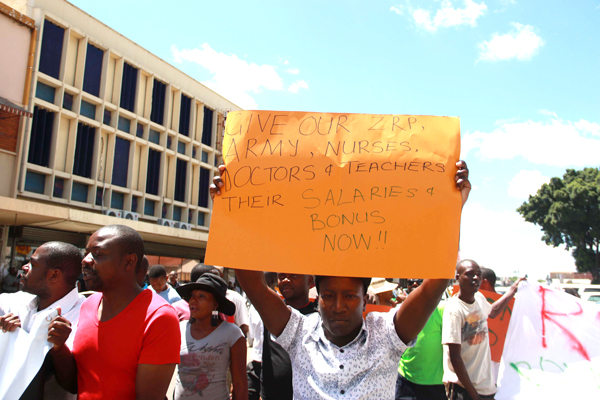
BY BRENNA MATENDERE
THE World’s biggest sectoral union federation, Education International (EI), has criticised the Zimbabwean government over the deteriorating labour situation and poor welfare of teachers.
EI is a global organisation of trade unions representing teachers and it has 401 member-organisations in 172 countries. The body is currently conducting its eighth world congress in Bangkok, Thailand, where leaders of teacher-unions from Zimbabwe are in attendance.
In a telephone interview from Bangkok with NewDay yesterday, Progressive Teachers Union of Zimbabwe president Takavafira Zhou said EI had expressed grave concern over the state of affairs.
“The EI noted that Zimbabwe is far from setting and achieving any international best practice benchmarks politically, economically and socially. Some of the issues which put the country on spotlight include violations of human rights evidenced by the shooting of innocent civilians, harassment of teachers, threat to access to public education and eradication of child labour as well as the parlous status of teachers that threaten quality education for all,” he said.
The PTUZ leader also highlighted that the EI was concerned by lack of adequate resources being channelled into the education sector.
“The EI was concerned that education (in Zimbabwe) is not a priority as reflected by restricted budget, and government’s imposition of educational reforms without engaging teachers. EI encouraged Zimbabwean teachers to unite, forge alliances with students, parents, traditional leaders and university lecturers in order to confront government,” Zhou said.
“EI also encouraged teachers and university lecturers to use research that can influence institutional reforms for democracy and corporate governance, and approach government and community with action research in order to influence policy formulation and implementation and build alliances with communities and influence their response against the government.”
- Chamisa under fire over US$120K donation
- Mavhunga puts DeMbare into Chibuku quarterfinals
- Pension funds bet on Cabora Bassa oilfields
- Councils defy govt fire tender directive
Keep Reading
Last month, Public Service minister Sekai Nzenza told an International Labour Organisation (ILO) conference that all was well in the country.
However, Zhou said trade unionists in Bangkok expressed anger over those utterances after it dawned on them that the situation was actually dire in the country.
“What seems to have angered many trade unionists is the arrogant Public Service, Labour and Social Welfare minister Sekai Nzenza’s arrogance and rogue conceptualisation of labour laws in a recent ILO meeting which was attended by several trade unionists present at the current EI meeting. The anger specifically emanated from her assertion that Zimbabwe has no labour challenges, yet the country does not respect conventions 87 and 98 of ILO in spite of having ratified these Conventions. We are even failing to respect section 65 of the Constitution of Zimbabwe which guarantees the right to demonstrate and protest,” Zhou said.
“It is also encouraging that much as trade unionists from Zimbabwe are not effectively collaborating in Zimbabwe, there is consensus in Thailand that the Zimbabwean government’s engagement with its employees under the National Joint Negotiating Council and Apex Council is a monument of Zimbabwean injustice and unfair labour practice. One can only hope that such co-operation will be put into practical use in Zimbabwe.”











